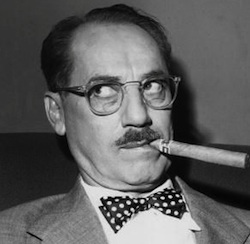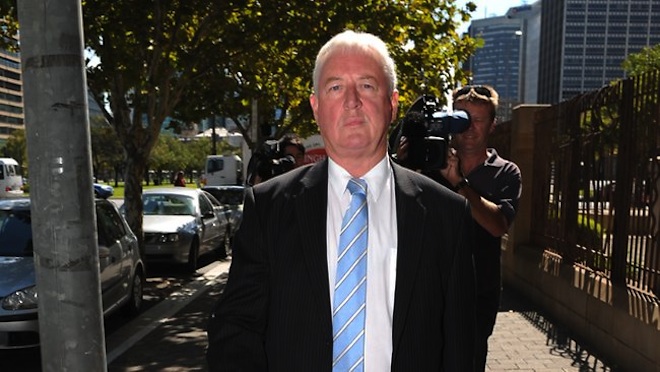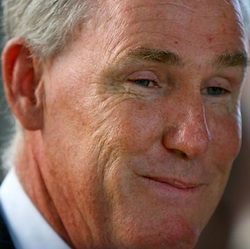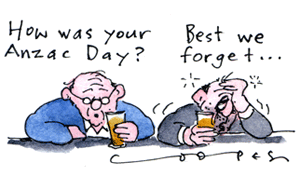Help - I'm in the same club as Eugene McGee
 Barry Lane •
Barry Lane •  Wednesday, March 7, 2012
Wednesday, March 7, 2012 The Eugene McGee hit-run case was chillingly investigated by the ABC's Australian Story ... Police and lawyers mutual protection society hard at work ... McGee slips through the system ... The brain-snap defence ... Bitterness in the small club of the Adelaide legal establishment ... Barry Lane reports
 Marx: no clubAs Groucho Marx said: "I don't want to belong to any club that accepts me as a member."
Marx: no clubAs Groucho Marx said: "I don't want to belong to any club that accepts me as a member."
After watching the excellent, but deeply disturbing, two-parter on Australian Story - Road to Nowhere (part 1 and part 2 ) - I wondered what sort of learned and noble profession I belonged to that was content to allow fellow lawyer Eugene McGee to remain in its ranks.
It is widely known that McGee is the hit-and-run Adelaide lawyer and former policeman who, after a well lubricated three-and-a-half hour lunch with his brother and mother at the Wheatsheaf Hotel on November 20, 2003, drove into and killed cyclist Ian Humphrey near Kapunda.
Three minutes after he struck Humphrey and drove on, McGee made the first of many phone calls - to his lawyer, his wife, his brother and his mother - at least 12 calls in all.
His brother Craig told him that police were already at his home looking for him. Both Craig and McGee's wife, Barbara, falsely told the police they hadn't heard from him and don't know his whereabouts.
Craig McGee then drove Eugene back to Adelaide, sneaking through the police roadblock at the scene of the accident without identifying themselves.
McGee's avoidance of the police meant that it was not until 11.30 that night before officers were able to speak to him. McGee read from a prepared statement. The police noted they could smell alcohol on his breath.
In a moment of shock and horror when a driver unintentionally kills someone there is a distinct possibility for the perpetrator to experience a "brain snap", to use the euphemism frequently employed in courts these days.
It's understandable that McGee might not have stopped immediately after running down Ian Humphrey, but then moments later one would expect that an experienced professional would come to his senses, drop a uie, and return to the scene of the tragedy, render assistance and call an ambulance.
In other words, do what common decency and the law required.
Instead, McGee thought only of himself and scurried to secure the best outcome he could conjure.
In the same vein, one can see a ship's captain elbowing women and children aside to get into a life boat and a medico snaffling for himself the last dose of plague inoculation.
 McGee: hit and ran
McGee: hit and ran
Fortuitously for him, McGee's "brain snap" ended after the expiration of the relevant period during which police might have lawfully demanded a blood or other bodily sample from him.
He then made himself available for interview after obtaining, as was his right of course, the benefit of legal advice and assistance.
Lawyers bang-on incessantly that they stand between the cruel weight of the state and hapless defendants - unless, of course, the hapless defendant happens to be a lawyer.
The state is supposed to stick up for the victim of a lawyer, but if this case is anything to go by, the State of South Australia failed miserably.
At his trial in 2005 McGee was acquitted of causing death by dangerous driving. He was convicted of the lesser offence of driving without due care and failure to stop and render assistance following an accident.
He was fined $2,250 and disqualified from driving for 12 months.
The psychiatric evidence for McGee was that he exhibited post-traumatic stress following the accident.
McGee admitted that he had not sought treatment for the condition until two and a half-months after he mowed down and killed Ian Humphrey.
Witnesses who saw McGee driving in an erratic and dangerous manner were not called to give evidence at the trial.
McGee had not been breath-tested by police. Sergeant Hassell said in evidence that he was short-staffed and under pressure and a breath-test was not something he considered at the time.
The outcry was so great that a Royal Commission was appointed - the commissioner being the Sydney judge Greg James.
The terms of reference focussed on the extraordinary way in which the police investigated the crime and the conduct of the trial: failure to require McGee to undergo a breath test; whether the principal witness had a proper opportunity to give evidence about McGee's driving immediately before the collision; why other witness were not called; and why the prosecution did not lead evidence rebutting the defence's psychiatric evidence.
McGee was represented by the president of the SA bar 'n' grill Malcolm Blue QC, now Justice Blue of the Supremes.
James came up with a bundle of recommendations:
- More extensive pre-trial disclosure of expert evidence;
- That the law be changed to allow police to be able forcibly to enter premises for searches;
- The penalty for death by dangerous driving to be increased so that it is the same as manslaughter;
- Increased penalties for leaving an accident; and
- Attempting to disguise blood alcohol levels should be an offence.
There was also a second secret report that went to relevant ministers and the police.
Further charges were laid against Eugene and Craig McGee: conspiring to pervert the course of justice and perverting the course of justice.
The allegation was that they had worked together to "frustrate, deflect or prevent" a proper investigation.
After various delays in coming to trial Judge Peter Herriman acquitted both McGees. He swallowed the defence case, saying:
"There was no legal obligation then falling upon Eugene to surrender himself or upon either of them to assist police."
Their actions did not amount to an unlawful purpose. The defence cited a 1972 House of Lords immigration case in which held there was no obligation for an Indian immigrant to turn himself in because he had not been directed to do so by the authorities.
McGee's lawyers argued this was "directly analogous".
* * *
The South Australian Legal Practitioners Conduct Board compounded the shameful situation by finding in April last year that McGee was not guilty of "infamous conduct".
The board's report has remained secret, but it is understood it accepted that the lawyer was suffering post-traumatic stress disorder and that it could only consider his actions in the first seconds of the crash and not take into account the telephone calls to his lawyer and family, and his avoidance of the police.
In December attorney general John Rau said he would not be referring the matter to the Legal Practitioners Disciplinary Tribunal. Under the Legal Practitioners Act he said it was open to the board to find that unprofessional conduct could not be proved.
Following the broadcast of the two programs on Australian Story Senator Nick (Sound Bite) Xenophon urged South Australians to get in touch with their local MPs and lobby to have the AG refer McGee to the tribunal.
He pointed to the Facebook page - Justice for Ian, called for the Conduct Board to be sacked and for the Crown law advice on which Rau based his decision to be released.
* * *
 Atkinson: pressed for McGee to be sent to the Bureau de Spank Former attorney general Michael Atkinson has also been on the case.
Atkinson: pressed for McGee to be sent to the Bureau de Spank Former attorney general Michael Atkinson has also been on the case.
He was interviewed by Australian Story, but there were interesting bits from Atkinson that hit the cutting room floor, including:
"In my opinion the public was scandalised by Mr McGee leaving the scene of the collision, pulling into a quarry and making a series of mobile telephone calls, including to his lawyer. And then moving through the police cordon, being driven by his brother in what we presume was the knowledge on his part that that cordon was for the purposes of finding him. And then drinking with his lawyer, to all intents and appearances having a drink with his lawyer or lawyers before then finally calling the police.
[snip]
My opinion is that the public may not have confidence in the Legal Practitioners Conduct Board until such time as the law society is removed from the business of disciplining lawyers completely and forever. And by all means have lawyers on the Legal Practitioners Conduct Board but do not have them there on the nomination of the law society.
[snip]
The law allows the attorney general to refer the case direct to the tribunal without going through the board, or if the board takes a different view to go over the head of the board. But the attorney general I think we can say is resolved not to do that.
[snip]
"I think some people in the law society took the view that the Rann government was victimising its valued member Eugene McGee in parliamentary debate, victimising him by calling a royal commission, victimising him by prosecuting him for conspiracy to pervert the course of justice and victimising him by referring the matter as I did as attorney general to the Legal Practitioners Conduct Board ... Respectfully I disagree with the law society."
* * *
Two similar cases where drivers unintentionally killed other road uses are instructive.
Neither of these drivers was a lawyer, one was a 22-year-old recently qualified dentist, Silvia Nicole Ciach, and the other was a 36-year-old truck driver, Paul Browning.
Both drivers were texting on mobile phones when they collided with, and killed, their victims.
However, unlike McGee, both stayed at the scene of their offences, admitted responsibility for their misconduct and pleaded guilty to culpable driving or causing death by dangerous driving.
HH Judge Daniel Worsley of Southend Crown Court (UK) said he accepted that Browning was a "decent family man" and was "very remorseful".
Browning, "a decent and remorseful family man", was nonetheless jailed for five years while Ciach was given a suspended sentence.
Of Browning's offending, Judge Worsley said:
"Many sorts of dangerous driving and causing death by dangerous driving have come before these courts but this is rather different and in many ways it is difficult to imagine a more blatant act of such of cold blooded disregard for safety on the roads ...
Text messages are now very cheap and in use by huge numbers and in all these circumstances in my judgment a stern deterrent sentence is necessary."
In relation to the Ciach sentencing by HH Judge Susan Cohen of the Victorian County Court, it was reported:
"In determining the sentence she had taken into account Ciach's guilty plea and otherwise excellent character, and statements from Mr Marsh's (the victim) parents that they had no wish for Ciach to be jailed.
'Those statements not only indicate that they are people of compassion, in light of their grief on the loss of an obviously much-loved and admired son and friend, but also reflect that your acceptance of responsibility ... has helped them to forgive and to take a view of the future in which yours is not ruined."
McGee has been advertising his legal skills as a defence lawyer for drink driving, culpable driving and dangerous driving offences.










Reader Comments